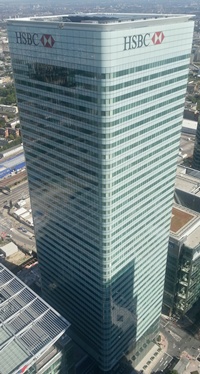HSBC to shed 50,000 jobs as it reshapes business portfolio
09 Jun 2015
HSBC, Europe's biggest lender, today unveiled plans for a major restructuring of its business portfolio and redeployment of resources to capture expected future growth opportunities and adapt to structural changes in the operating environment.
 The restructuring, aimed at simplifying and improving HSBC's sluggish performance, will involve axing almost 50,000 jobs worldwide and hiving off of its investment bank.
The restructuring, aimed at simplifying and improving HSBC's sluggish performance, will involve axing almost 50,000 jobs worldwide and hiving off of its investment bank.
The restructuring, which also involves the sale of businesses in Brazil and Turkey, will reduce the assets of the global banking giant by a quarter.
HSBC said about half the staff cuts will come from the sale of businesses in Brazil and Turkey. The other half will come from cutting about 10 per cent of the remaining 233,000 staff by consolidating IT and back office operations and closing branches.
In the UK, one in every six employees will lose their jobs as the bank plans to cut about 7,000-8,000 jobs there.
The bank will separate its British retail banking operation, which will be based in Birmingham in central England. The "ring-fenced" bank will account for about two thirds of UK revenues, or $11 billion, and will have some 26,000 staff, or 57 per cent of the total in the United Kingdom.
HSBC expects to have 208,000 full-time employees post-restructuring by 2017, down from 295,000 at the end of 2010 and 258,000 at the end of 2014. However, the bank said it will be hiring in growth businesses and its compliance division.
HSBC said it is redeploying resources to capture expected future growth opportunities and adapting to structural changes in the operating environment.
HSBC is targeting a reduction of group risk weighted assets (RWAs) of about $290 bilion, including a reduction of global banking and markets RWAs to less than one-third of group RWAs.
The restructuring will result in annual cost savings of up to $5 billion by 2017 while the restructuring itself would cost HSBC up to $4.5 billion in the next three years, Stuart Gulliver, group chief executive, said.
The bank, meanwhile, lowered its target for return on equity to greater than 10 per cent by 2017, down from a previous target of 12-15 per cent by 2016.
HSBC's international network covers about 90 per cent of global trade and capital flows, providing access to the world's highest growth markets.
Its client revenues linked to its international business contributed approximately 40 per cent of group client revenues for the year ended 31 December 2014.
The group intends to accelerate investments in Asia, developing its business in both the Pearl River Delta in Guangdong province, China, and in the ASEAN region as the bank pushes the renminbi's internationalisation.
It will leverage opportunities from its market leading position in renminbi internationalisation.
It plans to expand asset management and insurance in Asia with the aim of capturing expected opportunities from emerging wealth in the region.
HSBC expects its international business to deliver above GDP revenue growth through investment in foreign exchange, payments and cash management, and global trade and receivables finance.
The group will target a return on equity of greater than 10 per cent by 2017, positive adjusted jaws (revenue growth in excess of cost growth), and progressive dividends to shareholders.
''HSBC has an unrivalled global position: access to high growth markets; a diversified universal banking model with strong funding and a low risk profile; and strong internal capital generation with industry leading dividends...We recognise that the world has changed and we need to change with it,'' Stuart Gulliver, group chief executive, said.
Gulliver outlined the ten strategic actions that the bank plans to further transform the organisation:
- Reduce group RWAs by at least circa 25 per cent and redeploy towards higher performing businesses; restore GB&M profitability;
- Sell operations in Turkey and Brazil but plan to maintain a presence in Brazil to serve large corporate clients with respect to their international needs; continued application of six filter process;
- Rebuild NAFTA profitability;
- Set up UK Ring-Fenced Bank;
- Realise $4.5-5.0bn cost savings, deliver flat costs by end 2017;
- Deliver growth above GDP from international network;
- Capture growth opportunities in Asia: Pearl River Delta, ASEAN, Asset Management, Insurance;
- Extend leadership in RMB internationalisation;
- Complete Global Standards implementation; and
- Complete headquarters review by end 2015.
''The world is increasingly connected, with Asia expected to show high growth and become the centre of global trade over the next decade. I am confident that our actions will allow us to capture expected future growth opportunities and deliver further value to shareholders.''
HSBC said it would complete the review of the possible move by the end of the year.


















